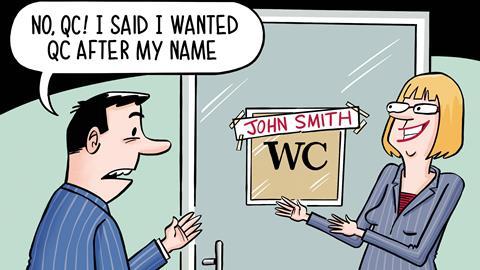As QC applications open, Jonathan Rayner finds out what it takes for a solicitor to make the grade
‘I can’t possibly compete against barristers who spend much of their working lives in court,’ is a common refrain from solicitors who decide not to seek Queen’s Counsel (QC) status. Other solicitor advocates are deterred by the 65-page application form, the completion of which eats up many billable hours. Others cite unhelpful law firm management, who chorus something along the lines of: ‘We’re doing very nicely, thank you, without distracting our top litigators from their day job by making them jump through hoops.’ And some solicitors are simply unaware that they are eligible to apply for QC status – a symbol of excellence in advocacy that is recognised globally.

There were just five solicitors among the 101 lawyers named in the 2021 list of QC appointments. That is around 5% of successful applicants. The QC appointments of 2020 and 2019 told a broadly similar story.
Yet the system is not as biased in favour of barristers as it might at first seem. The simple truth is that far fewer solicitor advocates than barristers apply. This is despite attempts by QC Appointments, the Law Society and the Bar Council to persuade, in the interests of diversity, more solicitors to engage, and the fact that, as a solicitor advocate, the prospective candidate will already have achieved, through training and assessments, the same higher rights of audience.
'Women generally only make their first application when they are confident that they meet every one of the qualifying requirements'
Amanda Brown QC, KPMG Law
There are obvious tangible benefits to becoming a QC too. Silks can charge higher fees, and are instructed on the more complex and interesting cases.
The Gazette spoke to Amanda Brown QC, a solicitor advocate specialising in tax at KPMG Law, who took silk in October 2021.
‘I was appointed QC at first attempt,’ she says, ‘which is unusual, but then women tend to navigate the selection process more successfully than men and require fewer attempts. That’s because women generally only make their first application when they are confident that they meet every one of the qualifying requirements. Men, on the other hand, are happy just to give it a go and learn from the experience.’
What prompted her to apply? ‘I was at a judicial conference [she is a fee-paid judge of the First-tier Tribunal allocated to the Tax and Social Entitlement chambers] when one of the judges asked me: “Have you ever thought about taking silk?” I replied no, because I’m not a barrister, only to be told that I didn’t need to be a barrister. That sowed the seeds of my decision to apply to become a QC.’

So was it plain sailing from then onwards? ‘Far from it,’ responds Brown. ‘As I told a colleague: I’m not posh enough, I’m not barrister enough and I’m not the same [as the predominately male, privately educated QCs she had met] enough. This is ridiculous.’
Brown was told that if all solicitor advocates self-filtered like her, then no solicitor would ever apply to take silk. Some colleagues even went as far as to threaten to send in her application on her behalf. That convinced her to commit to the application process.
‘I’m a quite methodical and rigorous individual and set about applying by talking to a random group of QCs that I know,’ Brown recalls. The informal research gave her an insight not only into how to pitch her application, but also what she should expect if invited to an interview. She spent a year putting together a profile of her 12 best cases and preparing herself for the searching questions that the interview would inevitably include.
To this end, she followed the STAR interview technique – situation, task, action and result – to give a common form to the various cases she referred to. ‘But the hardest bit about the application form was finessing it into just 4,000 characters – that’s punctuation marks, the gaps between words and the words themselves – statements for each of the five competencies mandated by the selection board.’
The five competencies are:
- understanding and using the law;
- written and oral advocacy;
- working (productively) with others;
- showing an understanding of diversity and cultural issues; and
- integrity.
The cases an applicant uses as evidence that they excel at these competencies must be supported by written assessments of the candidate’s abilities penned by judges or other assessors involved with each case.
'I can assure prospective candidates that the QC selection panel is acutely aware that solicitor advocates have a different type of experience to barristers who may be in court every week, and members of the panel certainly take that into account'
Dipen Sabharwal QC, White & Case
What impact has taking silk had on her practice? Brown replies: ‘One colleague said: “That’s fantastic. I didn’t know you were that good. Can I start taking you with me to meet clients?”.’ She adds that it is not a universal panacea. ‘We still need to use external bars where our particular skill-set doesn’t meet needs. And [achieving QC status] mostly made a difference to clients who didn’t know me. Those who did know me were simply delighted.’

To summarise: don’t pre-judge your aptitude for the role, do your research and give yourself plenty of time to prepare.
Other solicitor QCs add their words of encouragement. ‘Don’t allow closed shops and glass ceilings to become lazy excuses for not pursuing your ambitions,’ says one. Another urges: ‘Work hard to achieve great academic results, attend court whenever the opportunity arises, take part in moots and seek out mini-pupillages.’ A third stresses the importance of beginning the application process early: ‘Start working on the application form well before the deadline for submission. Work on it for an hour or two evenings and weekends. Leave it for a while and then come back to it with a fresh mind. And remember: It is vital to make every word count.’
Dipen Sabharwal QC, an international arbitration partner at White & Case, cautions against pre-judging your eligibility. ‘Solicitors may think there is no way they can meet the criteria, but this shouldn’t put applicants off,’ he says. ‘I can assure prospective candidates that the QC selection panel is acutely aware that solicitor advocates have a different type of experience to barristers who may be in court every week, and members of the panel certainly take that into account.’
Taking silk – step by step
- First, contact QC Appointments (qca.org) – the body is responsible for the appointment of all QCs, whether solicitor advocates with higher rights of audience or barristers. QCA provides advice on how to proceed and access to case histories of candidates who have gone through the process before. Its website includes a Competency Framework detailing the five competencies that you will have to demonstrate that you possess to a standard of excellence in your professional life. The selection panel seek evidence that these competencies have been demonstrated in cases of substance, complexity, particular difficulty or sensitivity.
- The QCA is wholly self-financed and is independent of the Law Society and the Bar Council.
- The appointment process begins with a 65-page application form. It asks you searching questions about your career to date, and invites you to explain how you excel at, not just comply with, the five required competencies – after all, you are applying for a badge of excellence.
- The five competencies are:
- understanding and using the law;
- written and oral advocacy;
- working (productively) with others;
- showing an understanding of diversity and cultural issues; and
- having an unblemished record of integrity. - A fee of £1,800 plus VAT is payable upon submitting a completed application form.
- Your application will be considered by one lay and one professional member of the nine-person selection panel.
- The selection panel comprises one or two retired or serving judges, senior lawyers (solicitors or barristers) and distinguished lay people, one of whom will be the chair. There will be the same number of lay people on the panel as lawyers (excluding judges).
- If two of the panel members decide your application fails to sufficiently demonstrate excellence at the five competencies to merit an interview, the full selection panel will review the decision and confirm it or otherwise.
- If your completed application form is deemed successful, you will then be interviewed by one lay and one professional member of the panel.
- Your two interviewers will then grade your application, before the full selection panel reviews your grade through collective moderation and scrutiny of borderline cases.
- The panel then finalises the list of successful candidates, and provides unsuccessful candidates with written feedback.
- Upon appointment as QC, a fee of £3,000 plus VAT is payable. Applicants on low incomes (that is earning gross fees below £60,000) pay £1,500 plus VAT.
This procedure for selecting QCs that replaced the traditional ‘tap on the shoulder’ and ‘secret soundings’ was designed by the Law Society and the Bar Council, and was approved in November 2006 by the then Department for Constitutional Affairs. It has been modified in January 2014, February 2019 and September 2020
Applications for QC appointments in the 2022 round opened yesterday
































2 Readers' comments